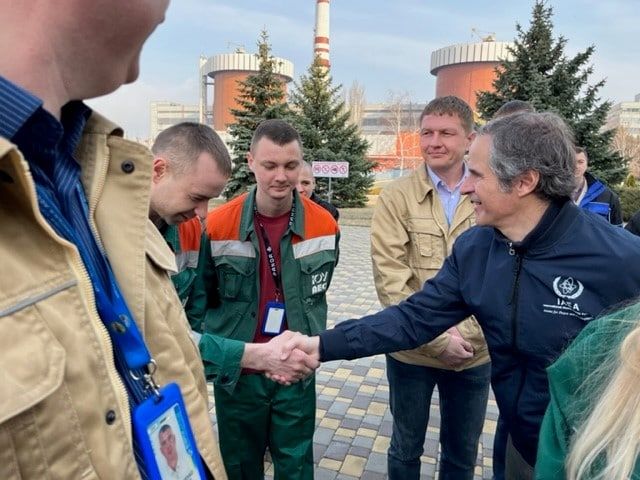Dealing with Russian contempt for the IAEA in Ukraine
By Victor Gilinsky, Henry Sokolski | July 28, 2022
 IAEA Director General Rafael Mariano Grossi met with senior Ukrainian government officials and staff at the South Ukraine Nuclear Power Plant on March 29. Credit: Fredrik Dahl / IAEA
IAEA Director General Rafael Mariano Grossi met with senior Ukrainian government officials and staff at the South Ukraine Nuclear Power Plant on March 29. Credit: Fredrik Dahl / IAEA
On March 12 the Russian invaders informed the managers of Ukraine’s six-reactor Zaporizhzhia nuclear power plant, the largest in Europe, that the plant now belonged to, and would be run by, Rosatom, the Russian state nuclear power company. No country had ever seized another’s nuclear facility by force. Never have power reactor operators run a captured nuclear plant at gunpoint. This is not just a figure of speech. In May Russian forces shot a plant technician they suspected of passing information to Ukraine. More recently, the Russian military has turned the plant into a missile base, knowing the Ukrainians would not shoot back at a reactor site. The site is covered by an agreement with the International Atomic Energy Agency (IAEA) for periodic inspections, which Russia has effectively abrogated.
Why does this matter? The “safeguards” agreements with the IAEA, standard for all members of the Non-Proliferation Treaty (NPT) with nuclear power plants, are absolutely fundamental to legitimizing the peaceful applications of nuclear energy throughout the world. All NPT states have an interest in the way they are carried out at every other member’s facilities. Each agreement stipulates that IAEA inspectors will have plant access, under the auspices of the agreeing state, in this case Ukraine, to ensure that the nuclear activities are indeed peaceful. The Russians, who have taken plant by force, are now effectively telling the IAEA, “If you want access to the site, you have to forget about your agreement with Ukraine and come to us for permission, and thereby acknowledge that this is now a Russian plant.” The member countries of the IAEA face a decision: Which is more important, IAEA inspector access to the Zaporizhzhia site, or upholding the IAEA’s international system of safeguards by honoring the IAEA’s agreement with Ukraine and refusing Russian terms for access?
In calling for IAEA inspections to resume, as he did again on June 29, IAEA Director General Rafael Mariano Grossi has repeatedly underlined the importance of the agency’s safeguards role and the need to maintain the continuity of information about nuclear materials at the plant. The Russians have restored data links with the plant, but there haven’t been any IAEA inspections since the Russian invasion. In his public announcements, Grossi has been careful to maintain the appearance that he is dealing with Ukraine regarding the plant, in the context of the Ukraine-IAEA agreement. But Grossi has discussed access with the Russians. This would inevitably involve consession to Russian control and therefore disregard of the Ukraine-IAEA agreement.
Concerning an IAEA inspection, President Putin’s press secretary, Dmitry Peskov, noted slyly: “Naturally, the organization of such a trip is accompanied by the need to resolve a whole range of logistics and technical issues—from which side to enter, from which territory, through which crossing points, on what transport, etc.” The relevance of this observation involved the location of the plant on the South bank of the Dnipro River—which is miles wide at this point, and Ukraine controls the other side. In principle, the IAEA could come through Ukranian territory on a boat. This is exactly what the Russians will not permit. They insist that inspectors come through Russian-held territory, with Russian passport checks, to demonstrate the legitimacy of Russian control.
The world needs to consider which is more important in this case: (1) making sure that the Ukrainians did not steal nuclear materials from the Zaporizhzhia nuclear power plant before the Russian takeover? Or (2) maintaining the international integrity of IAEA agreements and, specifically, the IAEA safeguards agreement with Ukraine?
Put another way: Can Russia, by invading, turn the Ukraine-IAEA agreement into a dead letter? The answer should be a resounding “no.” As important as inspections are, maintaining the integrity of that agreement is more important at this point than checking on the material at the Zaporizhzhia plant. And since the IAEA itself is a bit shaky on this point, the United States, as a leading IAEA member, needs to step in to clarify priorities.
The risk in postponing IAEA inspections at Zaporizhzhia is low. The question the IAEA wants to resolve by inspection onsite is whether Ukraine may have put some material in the plant to weapons use since the previous IAEA inspection. At a May 25 session of the World Economic Forum in Davos, Grossi put it rather dramatically (if in less-than-perfect English): “We hope to go there to prevent either there is a problem, or we end up finding out that a few hundred kilograms of weapons grade material going missing. This is what keeps us awake at night.” But there was no weapon grade material at the Zaporizhzhia nuclear power plant. The plant uses low-enriched uranium fuel and has no reprocessing plant to extract plutonium.
To take the most generous view, perhaps Grossi exaggerated to draw attention to the inspection problem. But in doing so, and implicitly raising the possibility of Ukranian non-compliance with the NPT, is inescapably to fall in with Russian propaganda. In his February 21, 2022 pre-war address, preparing the ground for the Russian invasion, Russian President Vladimir Putin talked of Ukraine’s intention “to create its own nuclear weapons.” He said, “We cannot but react to this real danger,” he said.
This is all nonsense but cannot be ignored.
No one knows how the fighting will end. If Russia remains in control of the Zaporizhzhia plant, will it permit IAEA inspections in the future? As one of the NPT’s five nuclear weapons states, it does not have to allow any inspections on its territory, which it effectively claims extends through Ukraine, on other than a token basis. If a nuclear weapon state like Russia could simply erase another’s agreement with the IAEA, it would be an expression of contempt for the IAEA inspection function, the sine qua non for peaceful international nuclear commerce, and with it, an expression of contempt for the NPT.
How the West reacts to the Russian takeover of the Zaporizhzhia nuclear power plant will affect the incentives for future would-be invaders. The top priority in Ukraine is to repel the Russians. But there are useful actions that can be taken in the IAEA context in response to Russian effective dismissal of the Ukraine-IAEA agreement. The IAEA should make clear that it will continue to act in accordance with its agreement with Ukraine. In the extreme, it could also suspend Russia from the agency for intefering with agency inspections. In dealing with this interference, the United States should take the lead.
Together, we make the world safer.
The Bulletin elevates expert voices above the noise. But as an independent nonprofit organization, our operations depend on the support of readers like you. Help us continue to deliver quality journalism that holds leaders accountable. Your support of our work at any level is important. In return, we promise our coverage will be understandable, influential, vigilant, solution-oriented, and fair-minded. Together we can make a difference.
Keywords: IAEA, Rafael Mariano Grossi, Russia, Ukraine, Zaporizhzhia nuclear power plant, inspections
Topics: Analysis, Nuclear Energy, Nuclear Risk

















“Legitimizing the peaceful applications of nuclear energy throughout the world” is exactly what the war in Ukraine shows CANNOT be done. Ever. Are we so shortsighted as to imagine that, in the course of the thousands of years lifetime of nuclear materials in every nuclear plant there will never be wars? Anywhere in the world? Are we so dumb as to imagine that no country that invades another in the future will be as “bad” or worse than Russia? It’s time to admit the whole nuclear era has been a colossal mistake. We need pro-nuclear experts like the writers to… Read more »
It’s too bad the Bulletin buried important messages about the respective and essential roles of the IAEA and the NPT in a Russophobic screed.
BBC news quotes IAEA’s saying today, “The Zaporizhzhia nuclear power plant is “out of control.’ ”
https://www.bbc.com/news/world-europe-62412429?at_medium=RSS&at_campaign=KARANGA